- Home
- China Miéville
The Scar Page 20
The Scar Read online
Page 20
He wandered away from the table, ostensibly for more stew, to avoid listening to Shekel’s embarrassing monologue: gratitude to Tanner and cajoling of the unconvinced Angevine combined. Over the chorus of go on Ange best mate Tanner you’re my best mate, Tanner saw that Angevine was unsettled. She was not used to offers like this, unless they meant incurring debts.
It ain’t for you, Tanner thought fervently, wishing he could tell her. It’s for the boy.
He moved further away while she and Shekel whispered to each other. He turned his back on them politely, stripped to his longjohns, and slipped into a tin bath full of brine. It soothed him. He soaked with the same sense of luxury that he once would have had for a hot bath, and he hoped that Angevine would understand his motivations.
She was nobody’s fool. After a short time she said with dignity something like thanks then, Tanner, that might be good. She said yes, and Tanner found to his mild surprise that he was glad.
Shekel was still excited by the clamor of silent sounds reading had given him, but with familiarity came control. He no longer found himself stopping midway along a corridor and gasping as the
word bulkhead or heads shouted itself to him from some ship’s sign.
For the first week or so, graffiti had been an intoxication. He had stood in front of walls and ships’ sides and let his eyes crawl across the morass of messages scratched or scrawled or painted on the city’s flanks. Such a diversity of styles: the same letters could be written tens of different ways but always say the same thing. Shekel never stopped enjoying that fact.
Most of what was written was rude or political or scatological. Dry Fall Fuck Off, he read. Names in scores. Somebody loves somebody, repeated again and again. Accusations, sexual and otherwise. Barsum or Peter or Oliver is a Cunt or a Whore or a Queer or whatever else it might be. The writing gave each declaration a different voice.
In the library, his ransacking of the shelves had become less furious, less drunken in its haste and exhilaration, but he still picked books out and laid them down in great numbers, and read them slowly and wrote down words he did not understand.
Sometimes he opened books and found words that had defeated him the first time he had seen them, and that he had then written down and learned. It delighted him. He felt like a fox that had tracked them. That was how it was with thorough, and climber, and khepri. When he encountered them for the second time, they surrendered to him, and he read them without pause.
In the shelves of foreign volumes, Shekel found release. He
was fascinated by their cryptic alphabets and orthographies, their strange pictures for foreign children. He came and rummaged among them when he needed quiet in his head. He could be assured that they would be silent.
Until the day that he picked one up and turned it in his hands, and it spoke to him.
At twilight, something idled out of the deep sea and came toward Armada.
It approached the last day-shift of engineers below the water. They were coming slowly up, clambering hand over hand up the ladders and pitted surfaces of the undercity, wheezing into their helmets, not looking down, not seeing what was coming.
Tanner Sack was sitting with Hedrigall on the edge of the Basilio docks. They dangled their legs like children over the side of a little cog, watching the cranes shift cargo.
Hedrigall was hinting at something. He spoke to Tanner obliquely. He hedged and implied, and Tanner understood that this was about the secret project, the unspoken thing that so many of his workmates shared. Without a scrap of that knowledge, Tanner could not make sense of what Hedrigall was saying. He could tell only that his friend was unhappy, and fearful of something.
A little way away they could see the corps of engineers emerge streaming from the water, climbing the ladders to rafts and weather-beaten steamers where juddering engines and colleagues and constructs pumped air for them.
The water in that little corner of the harbor began abruptly to bubble as if at a boil. Tanner touched Hedrigall’s forearm to quiet him, and stood, craning his neck.
There was a commotion at the water’s edge. Several workers rushed over and began to haul in the divers. More men surfaced, breaking the water in little bursts and scrabbling desperately at their helmets and at the ladders, fighting to get into the air. A furrow in the water swelled and broke the surface as Bastard John breached. He thrashed his tail wildly until it looked as if he stood unsteadily on the surface of the sea, and chattered like a monkey.
One man, hanging from a ladder, hunched out of the green water, finally threw off his helmet, and shrieked for help.
“Bonefish!” he screamed. “There are men down there!”
All around them people looked out of windows in alarm, left their work, and ran to the water, leaning out over the little trawlers bobbing in the middle of the harbor, pointing into the water and shouting to those on the docksides.
Tanner’s heart froze as billows of red coiled to the surface.
“Your knife!” he shouted to Hedrigall. “Give me your fucking knife!” He threw off his shirt and ran, without hesitating.
He leaped, his tentacles unwrapping from him, Hedrigall bellowing something unheard behind him. Then his long, webbed toes broke the surface, and with a burst of cold, he was in the water, and then under it.
Tanner blinked frantically, sliding his inner eyelid into place and peering down. In the middle distance, obscured by the sea, the shadows of submersibles prowled clumsily under the city.
He could see the last of the men clambering desperately toward the light, appallingly slow and clumsy in their suits. He saw places where great patches of blood discolored the water. A chunk of cartilage was drifting down through a haze of flesh, where one of Armada’s guard sharks had been torn apart.
Tanner kicked down, swimming fast. Some way off, at the base of a huge sunken pipe, sixty or more feet down, he saw a man clinging, immobilized by fear. And under him in the shadowy water, flickering this way and that like a flame, was a dark body.
Tanner balked, appalled. The thing was massive.
Above him, he heard the flattened reports of bodies hitting
the water. Armed men were descending, lowered from cranes, standing in harnesses, bristling with harpoons and spears, but they moved slowly, edging down by inches, at the mercy of the engines above them.
Bastard John streaked past Tanner, startling him, and from hidden corners of the city’s underside, Tanner saw the silent menfish of Bask riding slip through the water toward the predator below.
Emboldened, he kicked and plunged down again.
His mind rushed. He knew that attacks by big predators occurred sometimes—red sharks, wolfish, hooksquid, and others smashing into the fish cages and attacking the workers—but he had never experienced one. He had never seen a dinichthys, a bonefish.
He hefted Hedrigall’s knife.
With sudden disgust Tanner realized that he was passing through a cloud of blood-fouled water, and he could taste it in his mouth and across his gills. His stomach lurched as he saw, sinking slowly beside him, the ragged remnants of a diving suit with indistinct shreds waving within it.
And then he reached the bottom of the pipe, a few bodies’ lengths from the bleeding, motionless diver, and the creature beneath rose up to meet him.
He heard the pounding of water and felt an onrush of pressure, and looked down and screamed silently into the brine.
A great blunt-faced fish was rushing up toward him. Its head was encased in skull-armor, smooth and round like a cannonball, split by massive jaws in which Tanner saw not teeth, but two razor-ridges of bone chewing at the water, scraps of flesh fluttering from them. Its body was long and tapered, without contours or a fanning tail; its dorsal fin was low and streamlined, merging with its tailbone like some fat-bodied eel.
It was more than thirty feet long. It came at him, its mouth big enough to bite him in half without effort, its tiny little eyes stupid and malevolent behind their protective ridge. r />
Tanner howled with idiot bravery, brandishing his little knife.
Bastard John streaked across Tanner’s view, coming up behind the dinichthys, and butted it hard in the eye. The huge predator swerved with frightening speed and grace and snapped at the dolphin. The slabs of bone in its mouth crunched together and grated.
It veered violently and shot after Bastard John. With rushes of displaced water, little ivory lances streaked past as the newt-people fired their strange weapons at the dinichthys. It ignored them and bore down on the dolphin.
Tanner kicked violently away, his legs spasming as he raced toward the clinging diver. As he swam he looked around him and saw, to his horror, that the massive bone-plated fish had gone deep, despite Bastard John’s attempts to goad it, and was doubling back from below, heading straight for Tanner.
With a last kick, Tanner touched the rough metal of the pipe and scrabbled for the diver. Tanner stared at the dinichthys, his heart hammering as the monstrous thing powered toward him. The suckers of his tentacles anchored him to the shaft. He waved the knife in his right hand, praying for Bastard John or the newt-men or the armed divers to reach him. With his left he reached out for the trapped man.
His fumbling hand reached into something warm and soft, something that gave to his fingers in a horrifying way, and Tanner snatched his hand back. He glanced up for a second at the man beside him.
He looked into a faceplate full of water, and a wide-eyed white face, eyes protuberant, mouth distended and still. The leather in the center of the suit had been gouged away, and the man’s stomach was torn from him. Entrails waved in the water like anemones.
Tanner moaned and snapped away, sensing the dinichthys below him, kicking out fearfully, slashing ineffectually at nothing as with a sudden vicious tide the ridges and scales swept past him, tons of muscle flexing, the sound of bone on bone jarring through the water. The pipe shuddered as the corpse was snatched from it. The snub-skulled hunter zigzagged away through the inverted forest of Armada’s keels, the dead man dangling in its jaws.
Bastard John and the Bask menfish followed it, unable to match its effortless pace. In shock, Tanner kicked toward them pointlessly, the memory of the monstrous fish’s presence slowing him and making him cold. He was vaguely aware that he should surface, should keep himself warm and drink sweetened tea, that he felt sick and very frightened.
The dinichthys was heading down now, into the realms of crushing pressures its pursuers could not hope to survive. Tanner watched it go, moving slowly, trying not to breathe in any dissipating blood. He was alone now.
He dragged himself through water like tar, up past unfamiliar undersides, disoriented and lost. He could still see the dead man’s face and slick bowels. And as he found his bearings, as he twisted and saw the mobile ships in Basilio docks and the sprinkled crumblike boats of Winterstraw Market, he looked up and saw in the cold lancing shadow of the boat above him one of the huge, vague shapes that dangled from the city’s undersides, that was obscured by charms and carefully guarded, that he was forbidden to see. He saw that it was linked to others, and he drifted higher, unchallenged now the shark that had guarded it was dead, and the shape was clearer, and suddenly he was close, he was only a few yards from it, and he had penetrated the murk and the obfuscatory hexes, and he could see it clearly now, and he knew what it was.
The next day, Bellis was treated to lurid descriptions of the monster’s attack from several of her colleagues.
“Gods and fuck above,” said Carrianne to her, appalled. “Can you imagine? Sliced in pieces by that bastard?” Her descriptions became more grotesque and unpleasant.
Bellis did not give Carrianne her attention. She was thinking about what Silas had told her. She approached it as she did most things—coolly, trying to grasp it intellectually. She searched for books on The Gengris and the grindylow, but found very little that was not children’s myths or absurd speculation. She found it hard—impossibly hard, almost—to grasp the scale of danger to New Crobuzon. All the years of her life the city had squatted around her, massive and variegated and permanent. The idea that it could be threatened was almost inconceivable.
But, then, the grindylow were inconceivable, too.
Bellis found herself truly alarmed by Silas’ descriptions and his obvious fear. With a kind of morbid extravagance, Bellis had tried to imagine New Crobuzon after an invasion. Ruined and broken. It started as a game, a sort of dare, where she filled her mind with horrifying images. But then they flickered through her unstoppably, as if projected by a magic lantern, and they appalled her.
She saw the rivers congealed with bodies, and shimmering
as grindylow passed beneath. She saw petal-ash spewing from
the burnt-out Fuchsia House; shattered rubble in Gargoyle Park; the Glasshouse cracked open like an egg and stacked with cactus corpses. She imagined Perdido Street Station itself in collapse, its train lines twisted and splayed, its façade torn off, forcing its intricate architectural byways into the light.
Bellis imagined the ancient, massive Ribs that arced over the city snapped, their curves interrupted in a cascade of bone-dust.
It chilled her. But there was nothing she could do. No one here, no one in power in this city, could possibly care. She and Silas were alone, and until they understood what was happening in Armada, until they knew where they were going, Bellis could not think of any way she could get away.
Bellis heard the door open and looked up from her piles of books. Shekel stood at the threshold, holding something in his hands. She was about to greet him, but paused at the sight of his face.
He wore an expression of great seriousness and uncertainty, as if not sure whether he had done something wrong.
“I’ve got something to show you,” he said slowly. “You know I write down all the words I can’t work out at first. And then when I find them again in other books, I know them. Well . . .” He looked at the book he was holding. “Well, I found one of them yesterday. And the book’s not in Ragamoll, and the word’s not a . . . not a verb or a noun or whatever.” He stressed the technical words she had taught him: not with pride, but to make a point.
He handed the little book to her. “It’s a name.”
Bellis examined it. Sunk into the cover and picked out in stained metal leaf was the author’s name.
Krüach Aum.
The work that Tintinnabulum was looking for, one central to the Lovers’ project. Shekel had found it.
He had picked it off the children’s shelves. As Bellis sat and flicked through its pages, she saw that it was no wonder it had been misshelved. It was full of pictures in a primitive style: executed in thick, simple lines with childish perspective, so that proportions were unclear, and a man might be nearly the size of a tower next to him. Each recto page was text, each verso a picture, so that the whole short book had the feel of an illustrated fable.
Whoever had shelved it had obviously looked at it briefly without understanding it, and put it, without examination, with other picture books—children’s books. It had not been recorded. It had lain undisturbed for years.
Shekel was talking to Bellis, but she did not hear him clearly: don’t know what to do, he was saying awkwardly, thought you could help, the one Tintinnabulum was looking for, did the best thing. Adrenaline and tremulous excitement were filling her as she studied the volume. There was no title. She turned to the first page, and her heartbeat quickened in her throat as she realized that she
had been right about Aum’s name. The book was in High Kettai.
It was the arcane, classical language of Gnurr Kett, the island nation thousands of miles south of New Crobuzon, at the edge of the Swollen Ocean, where the warm water became the Black Sandbar Sea. It was a strange, very difficult tongue that used the Ragamoll script but derived from quite another root. Base Kettai, the everyday language, was much easier, but the relationship between the two was attenuated and ancient. Fluency in one gave only the slightest understanding of t
he other. High Kettai, even in Gnurr Kett itself, was the preserve of the cantors and a few intellectuals.
Bellis had studied it. Fascinated by its structures of embedded verbs, it was High Kettai that Bellis had made the subject of her first book. It was fifteen years since she had published High Kettai Grammatology, but even rusty as she was, looking at the opening chapter of the book, the meaning came slowly to her.
“I would lie if I told you that I write this without pride,” Bellis read silently, and looked up, trying to calm herself, almost afraid to go on.
She turned the pages rapidly, looking at the pictures. A man in a tower by the sea. The man on the shore, the skeletons of great engines littering the sand. The man making calculations by the sun, and by the shadows of strange trees. She turned to the fourth picture and caught her breath. A rill of goosebumps came and went over her.
In the fourth picture, the man stood again on the shore—his blank, stylized eyes the only features on his face, rendered by the artist as placid as a cow’s—and above the sea, swarming toward an approaching boat, was a cloud of dark figures. The picture was vague, but Bellis could see thin arms and legs dangling, and a blur of wings.
It made her uneasy.
She scanned, trying to remember the language. There was something very odd about this book. It felt very different from all the other High Kettai works Bellis had seen. Something incongruous was in the tone, quite at odds with the poetry that characterized the old Gnurr Kett canon.
“He would have sought help from outsiders,” she hesitantly made out, “but all others shun our island, fearful of our hungry women.”
Bellis looked up. Jabber knows, she thought, what I’ve got my hands on.
She thought quickly, trying to work out what she should do. Her hands still turned the pages like a construct’s, and she looked down to see that, midway through the volume, the man was at sea in a little boat. He and his vessel were drawn very small. He was lowering a chain and a massive recurved hook into the sea.

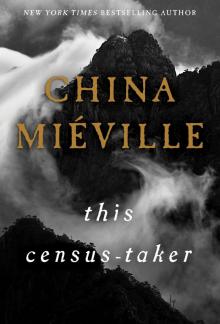 This Census-Taker
This Census-Taker Jack
Jack October: The Story of the Russian Revolution
October: The Story of the Russian Revolution The City & the City
The City & the City Looking for Jake: Stories
Looking for Jake: Stories Perdido Street Station
Perdido Street Station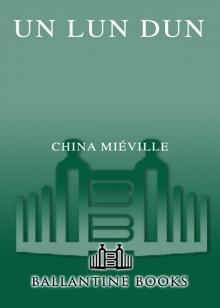 Un Lun Dun
Un Lun Dun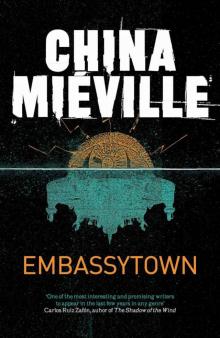 Embassytown
Embassytown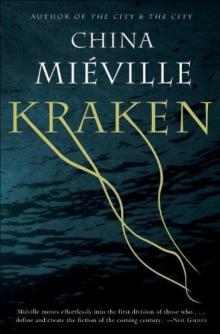 Kraken
Kraken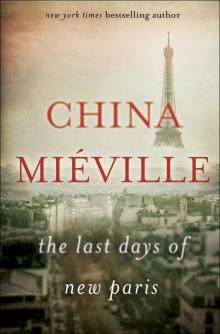 The Last Days of New Paris
The Last Days of New Paris Iron Council
Iron Council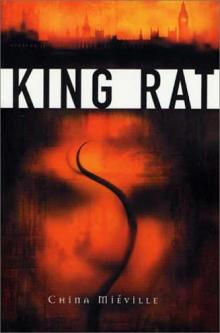 King Rat
King Rat Three Moments of an Explosion
Three Moments of an Explosion London's Overthrow
London's Overthrow October
October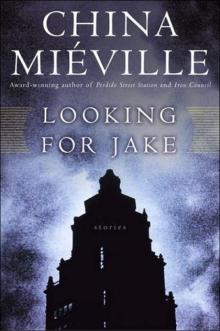 Jack (new crobuzon)
Jack (new crobuzon) Looking for Jake and Other Stories
Looking for Jake and Other Stories Looking for Jake
Looking for Jake